

HCA San Antonio
How To Maintain Fitness And Wellbeing In Seniors Through Covid-19. The advent of COVID-19 has made life as usual a thing of the past.
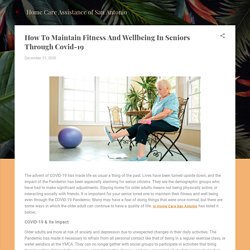
Lives have been turned upside down, and the impact of the Pandemic has been especially alarming for senior citizens. They are the demographic groups who have had to make significant adjustments. Staying home for older adults means not being physically active, or interacting socially with friends. It is important for your senior loved one to maintain their fitness and well being even through the COVID-19 Pandemic. Many may have a fear of doing things that were once normal, but there are some ways in which the older adult can continue to have a quality of life. COVID-19 & Its Impact Older adults are more at risk of anxiety and depression due to unexpected changes in their daily activities. What Are The Options? There are options for the older adults that can put some livelihood back into their life. Final Words.
How To Choose A Home Care Provider - Let HCA Help With Senior Care Services. There may come a time in the lives of adult children when they are faced with finding help for their senior parent who is aging in place.

The older adult cannot take care of the home or themselves properly anymore. They now need assistance with the household chores, their personal grooming and hygiene, and shopping. How Anxiety Can Be Contagious In Caregiving. Everyday, someone is living with an uncertainty and fear of the unknown.
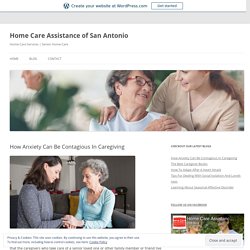
Aging can cause many changes, even in current health conditions. How To Care For An Aging Loved One After A Hospital Stay? Millions of senior citizens are hospitalized each year, and for the family and caregiver who love them, and the older adults themselves, these hospital stays can be frightening.
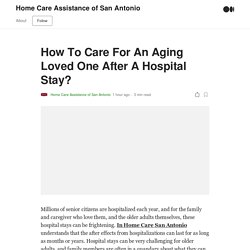
In Home Care San Antonio understands that the after effects from hospitalizations can last for as long as months or years. How Anxiety Can Be Contagious In Caregiving. Everyday, someone is living with an uncertainty and fear of the unknown.

Aging can cause many changes, even in current health conditions. Home Care Assistance of San Antonio. A caregiver is one who has been trained to care for the needs of others, mostly elderly adults.
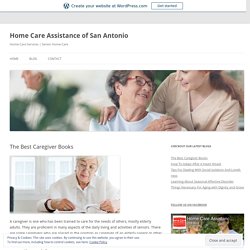
They are proficient in many aspects of the daily living and activities of seniors. There are some caregivers who are placed in the position as caregiver of an elderly parent or other loved one without the benefit of training. They assume the responsibility because they feel confident that they know how to care for their loved one. They soon learn that caregiving comes with many challenges.
Home Care Assistance of San Antonio — Long Distance Caregiving. Home Care Assistance of San Antonio. Heart attack is one of the leading causes of death in people over age 65.
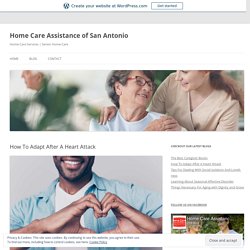
The main causes of heart attack in older adults are unhealthy eating habits, lack of physical activity, and underlying health issues and family history. Having a heart attack is very frightening, but with today’s technology and knowledge, the recovery rate is much better than in the latter part of the 20th century. Many older adults are even frightened of the possibility of having another heart attack after their recovery from the first. Tips to Help Elderly Adjust to Retirement.
For some, retirement is a breath of fresh air.
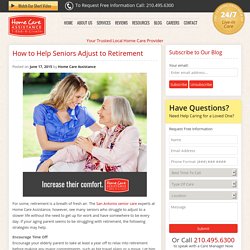
The San Antonio senior care experts at Home Care Assistance, however, see many seniors who struggle to adjust to a slower life without the need to get up for work and have somewhere to be every day. If your aging parent seems to be struggling with retirement, the following strategies may help. Tips for a Successful Hospital Discharge.
Transitioning from the hospital to home can be complicated and overwhelming for a senior and his or her loved ones.
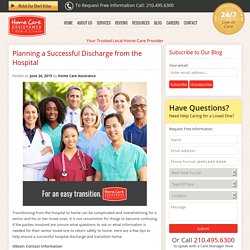
It is not uncommon for things to become confusing if the parties involved are unsure what questions to ask or what information is needed for their senior loved one to return safely to home. Here are a few tips to help ensure a successful hospital discharge and transition home. Obtain Contact Information. Easy Exercises That Promote More Restful Sleep for Seniors.
Some seniors tend to wake easily, have difficulty falling asleep, struggle with body-clock issues, and often experience insomnia, making a good night’s sleep seem impossible.
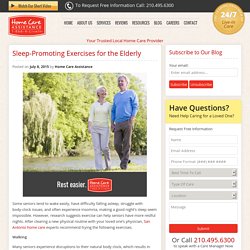
However, research suggests exercise can help seniors have more restful nights. After clearing a new physical routine with your loved one’s physician, San Antonio home care experts recommend trying the following exercises. Walking Many seniors experience disruptions to their natural body clock, which results in difficulty falling asleep at bedtime. Moderate aerobic exercise combined with exposure to natural light in the morning hours can reset the body’s biological clock, restore a more natural sleeping pattern, and help the body recognize sleep signals in the evening.
Pumping Iron Seniors who lift weights three times a week experience substantial improvements in sleep. Dancing Many seniors find themselves feeling drowsy shortly after the evening meal and succumb to a late nap. Can Seniors Take Sleeping Pills? Does your loved one suffer from persistent insomnia? Perhaps you’ve tried several sleep-promoting measures, all to no avail. Are you considering medication, but unsure if it’s the right decision? Here, Home Care Assistance in San Antonio, TX, presents what medical authorities say about drug-induced sleep for seniors. How Prescription Drugs Add Up Prescription sleep aids don’t go beyond the benchmark hours for sleep. Additionally, many classes of sleep aids decrease the time spent in deep sleep, and sleep medications often have hang-over-like effects. Flavorful Foods for Seniors with Compromised Taste. A decreased sense of taste is part of the natural aging process. Though it is not entirely known why this happens, it is known that our sense of taste is tied to our ability to see.
As we age and our eyesight diminishes, our sense of taste can diminish right along with it. At San Antonio Home Care Assistance, we know firsthand how challenging it can be to get a senior loved one to eat a balanced diet when the flavor just isn’t there. Depending on diet and nutritional restrictions, here are some helpful and easy things you can do to make eating more flavorful and healthy. 1. Handling Dementia and Alzheimer's Outbursts. Some seniors with dementia or Alzheimer’s, especially those in the later stages, demonstrate challenging behaviors like outbursts. When this happens, it’s important for family members and caregivers to remember it isn’t the senior speaking.
It’s the voice of dementia. With the deterioration of cognitive function, a senior with dementia or Alzheimer’s has difficulty recognizing his or her needs, understanding how to meet them, and communicating. Outbursts may also be triggered by pain, physical discomfort, medication side effects, hallucinations, and boredom. Sometimes, aggressive behavior is prompted by feeling rushed, afraid, or confused. Aggressive speech or actions. Essential Reading for Alzheimer's Caregivers. Alzheimer’s disease is a devastating illness that affects an estimated 5.3 million Americans.
Providing Alzheimer’s home care for a senior loved one is challenging and can take a toll mentally, emotionally, and financially. A number of books have been published that can help advise caregivers during their experience. The 36-Hour Day: A Family Guide to Caring for People Who Have Alzheimer’s Disease, Related Dementias, and Memory Loss, by Nancy L. Mace and Peter V. Rabins. Immunizations for Elderly Health. San Antonio senior care professionals points out that, contrary to popular belief, childhood immunizations wear off over time.
Consequently, your elderly loved one is likely to need some additional immunizations–even ones they already received years ago–to increase their natural immunity and prevent illnesses or conditions that tend to be more difficult for older individuals to tolerate. According to the Centers for Disease Control and Prevention, seniors are likely to need the following immunizations. Shingles (Zoster Vaccine) If your loved one ever had the chickenpox virus as a child (99 percent of Americans have had it, according to one estimate), they’re susceptible to developing shingles (herpes zoster), a painful skin rash that primarily affects people over the age of sixty. Doctors recommend another dose about five years after the first shot. Flu Shot. Healthy Foods That Can Ease Gout Pain. Why Stay Social in the Golden Years. We often hear that remaining socially active is an important part of healthy aging, but how exactly do social relationships affect overall senior health?
Read on and see what research is saying about robust social activity and its link to improved mental and physical wellbeing in older adults. Enhanced Mobility. How to Minimize a Senior's Fall Risk at Home. According to the Centers for Disease Control and Prevention, about half of all senior falls happen at home. Areas that used to be easy for seniors to navigate (stairs, the bathroom, and the kitchen) can become safety hazards, resulting in falls causing minor injuries, fractures, or long-term disability. Is Parkinson's Disease (PD) Treatable? Although there are a number of medications that can control the symptoms of Parkinson’s disease (PD), there are currently no treatments for reversing its effects. Helping a Senior Adjust to Post-Retirement Life.
6 Foods Denture Wearers Shouldn't Touch. Helping Elderly Adjust to Retirement. Home Care Assistance of San Antonio. Vitamin D, commonly recognized as the sunshine vitamin, helps seniors sustain cardiovascular function and lung and airway health, fights infection, and reduces risk for osteoporosis, arthritis, bone fractures, muscle weakness, and conditions such as diabetes, cancer, and arthritis. Surprising Number of Patients Not Told about Alzheimer's. While deciding not to inform a loved one of his or her Alzheimer’s diagnosis was once usual practice, today most San Antonio Alzheimer’s care experts — along with the Alzheimer’s Foundation of America — believe that you should be honest with a family member who has the disease.
The Power of Truth Many people are concerned that telling their loved one about the diagnosis will provoke a painful emotional reaction. However, while this may be true, the reality is that most people have an inkling that something is wrong before they are ever told they have Alzheimer’s disease, according to research published by the Journal of the American Geriatrics Society. In addition, doctors caution that while you may feel you are protecting your loved one by withholding the diagnosis, doing so can damage the trust he or she feels in you as a caregiver — as well as the confidence he or she feels for the doctor. Understanding Parkinson's Disease in Aging Adults. 6 Characteristics Families Overlook When Hiring a Caregiver. Tips for Regaining Hand Dexterity after a Stroke. Fast Facts about Falls among the Aging Population. 3 Steps for Starting an Exercise Plan after 65. Identifying Alzheimer's: The Early Warning Signs & Symptoms. The Importance of Oral Care & Hygiene for Older Adults.
Legal Planning for Seniors with Dementia. Combating the Most Common Senior Health Issues. Parkinson's Care: 5 Ways to Provide Support after a Diagnosis. Senior Mobility: Selecting & Sizing a Cane.